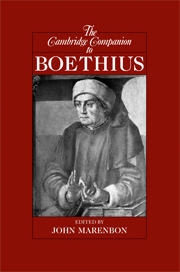Book contents
- Frontmatter
- Introduction: reading Boethius whole
- Part 1 Before the Consolation
- 1 Boethius’ life and the world of late antique philosophy
- 2 The Aristotelian commentator
- 3 The logical textbooks and their influence
- 4 Boethius on utterances, understanding and reality
- 5 The Opuscula sacra: Boethius and theology
- 6 The metaphysics of individuals in the Opuscula sacra
- 7 The medieval fortunes of the Opuscula sacra
- Part II The Consolation
- Appendix: Boethius’ works
- Bibliography
- Index: References to Boethius' works
- General Index
- Series list
6 - The metaphysics of individuals in the Opuscula sacra
from Part 1 - Before the Consolation
Published online by Cambridge University Press: 28 July 2009
- Frontmatter
- Introduction: reading Boethius whole
- Part 1 Before the Consolation
- 1 Boethius’ life and the world of late antique philosophy
- 2 The Aristotelian commentator
- 3 The logical textbooks and their influence
- 4 Boethius on utterances, understanding and reality
- 5 The Opuscula sacra: Boethius and theology
- 6 The metaphysics of individuals in the Opuscula sacra
- 7 The medieval fortunes of the Opuscula sacra
- Part II The Consolation
- Appendix: Boethius’ works
- Bibliography
- Index: References to Boethius' works
- General Index
- Series list
Summary
Three of the five treatises that comprise the Opuscula sacra contain interesting philosophical material. All three treatises attempt to make aspects of God intelligible using Greek philosophical concepts. The treatise Quomodo substantiae (OS III) discusses how something can be essentially predicated of both God and His creatures. On the Trinity (OS I) and Against Eutyches and Nestorius (OS V) are concerned with the individuality and unity of, respectively, God and Christ. Along the way to formulating his solution to his chosen puzzles, Boethius presents some of the elements of a general theory of individuals.
In this chapter we will concentrate on the general theory of individuals that can be reconstructed from Boethius' Opuscula. The theological treatises are not the only places that he discusses individuals, and at times we will make use of Boethius' commentaries on Aristotle and Porphyry to flesh out some of his remarks. Nonetheless, we will focus on the account of individuals that can be reconstructed from the theological treatises for two reasons. First, this account has exerted a tremendous influence on subsequent generations. Second, Boethius admits that his main role in the logical commentaries is to present a sympathetic elucidation of Aristotle's or Porphyry's views. The doctrines in the Opuscula presumably are Boethius' own.
- Type
- Chapter
- Information
- The Cambridge Companion to Boethius , pp. 129 - 154Publisher: Cambridge University PressPrint publication year: 2009



